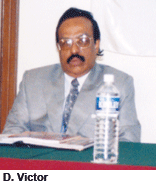Tamil Nadu: Annual scramble
 But the demand-supply gap in medical education in particular is so wide that all available seats are quickly filled. That’s because on offer are a mere 1,945 seats per year in 17 government medical colleges and 1,200 seats in self-financing medical colleges and deemed universities. Therefore medical college officials demanding illegal admission fees are the rule rather than exception.
But the demand-supply gap in medical education in particular is so wide that all available seats are quickly filled. That’s because on offer are a mere 1,945 seats per year in 17 government medical colleges and 1,200 seats in self-financing medical colleges and deemed universities. Therefore medical college officials demanding illegal admission fees are the rule rather than exception.Hemalatha Raghupathi (Chennai)















Add comment